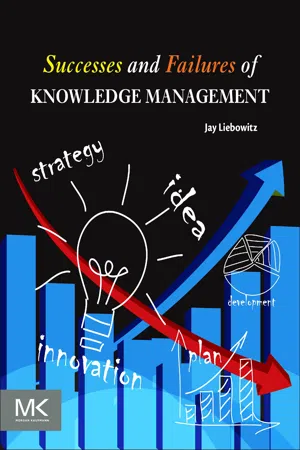
Successes and Failures of Knowledge Management
Jay Liebowitz
- 240 pagine
- English
- ePUB (disponibile sull'app)
- Disponibile su iOS e Android
Successes and Failures of Knowledge Management
Jay Liebowitz
Informazioni sul libro
Successes and Failures of Knowledge Management highlights examples from across multiple industries, demonstrating where the practice has been implemented well—and not so well—so others can learn from these cases during their knowledge management journey.
Knowledge management deals with how best to leverage knowledge both internally and externally in organizations to improve decision-making and facilitate knowledge capture and sharing. It is a critical part of an organization's fabric, and can be used to increase innovation, improve organizational internal and external effectiveness, build the institutional memory, and enhance organizational agility.
Starting by establishing KM processes, measures, and metrics, the book highlights ways to be successful in knowledge management institutionalization through learning from sample mistakes and successes. Whether an organization is already implementing KM or has been reluctant to do so, the ideas presented will stimulate the application of knowledge management as part of a human capital strategy in any organization.
- Provides keen insights for knowledge management practitioners and educators
- Conveys KM lessons learned through both successes and failures
- Includes straightforward, jargon-free case studies and research developed by the leading KM researchers and practitioners across industries
Domande frequenti
Informazioni
Parameters of knowledge management success
* Gatton College of Business, University of Kentucky, Lexington, KY, USA
** Lawrence Technological University, Southfield, MI, USA
† Eastern Kentucky University, Richmond, KY, USA
Abstract
Keywords
Introduction
Indice dei contenuti
- Cover
- Title page
- Table of Contents
- Copyright
- Dedication
- Contributors
- Preface
- Chapter 1: Parameters of knowledge management success
- Chapter 2: Why are companies still struggling to implement knowledge management? Answers from 34 experts in the field
- Chapter 3: REAL knowledge and the James Webb Space Telescope: success and failure coexisting in NASA
- Chapter 4: Processes: Still the poor relation in the knowledge management family?
- Chapter 5: KM successes and failures: some personal reflections on major challenges
- Chapter 6: Lessons learned from nearly 200 cases of KM journeys by Hong Kong and Asian Enterprises
- Chapter 7: Knowledge loss and retention: the paradoxical role of IT
- Chapter 8: Knowledge and knowledge-related assets: design for optimal application and impact
- Chapter 9: Knowledge management success and failure: the tale of two cases
- Chapter 10: Social knowledge: organizational currencies in the new knowledge economy
- Chapter 11: Knowledge management and analytical modeling for transformational leadership profiles in a multinational company
- Chapter 12: Success and failure in improvement of knowledge delivery to customers using chatbot—result of a case study in a Polish SME
- Chapter 13: Don’t neglect the foundation: how organizations can build their knowledge architecture and processes for long-term sustainability
- Chapter 14: Semantic technologies for enhancing knowledge management systems
- Subject Index